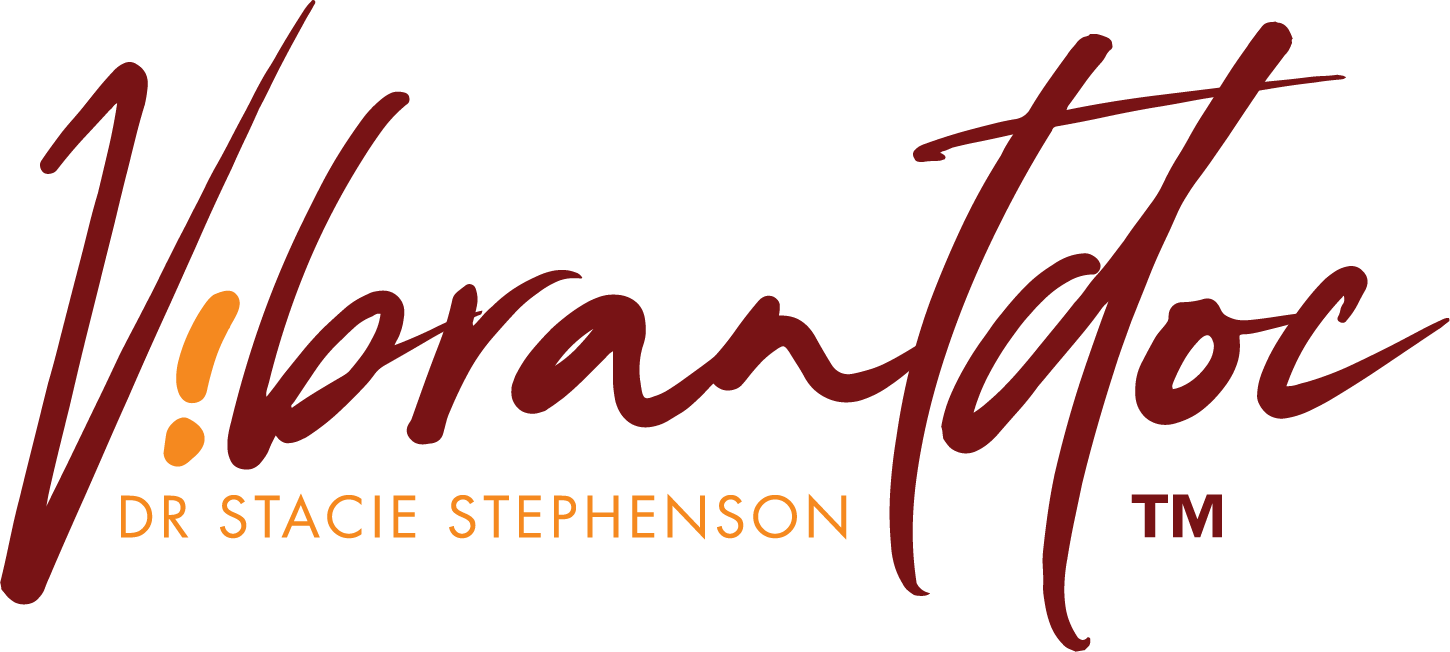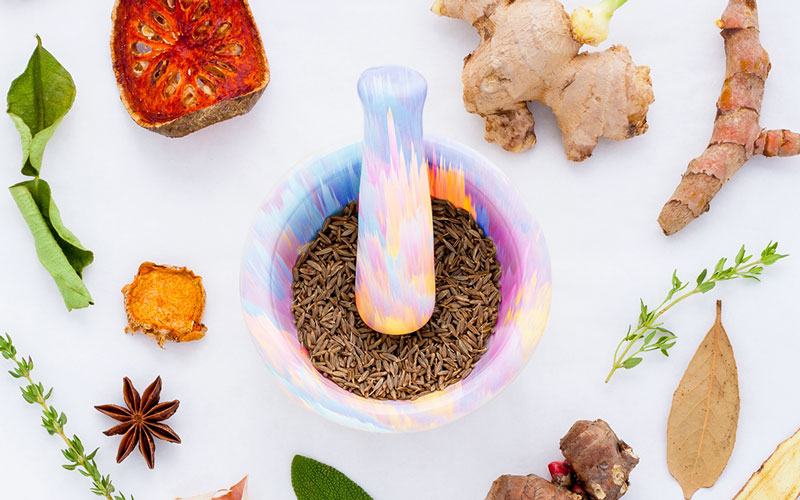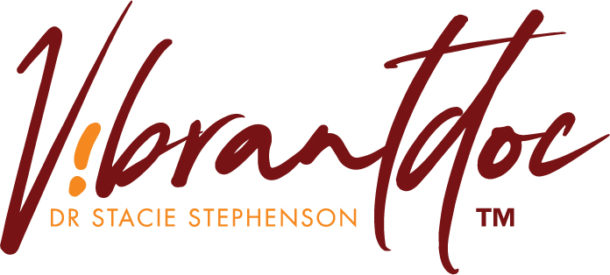Charles Darwin once wrote: “It is not the strongest of the species that survives, nor the most intelligent. It is the one that is most adaptable to change.” Assuming this is true (and I think it probably is), how do we, as people seeking to be healthy and vibrant, best adapt to the ever-changing circumstances life throws at us? There are many ways to become more adaptable and resilient, but one of my favorite tools is custom-made by nature to help us adapt: namely, adaptogens.
What are adaptogens? Adaptogens are substances from plants that have special properties that seem to help humans adapt to stressful conditions by regulating systems, balancing hormones, reducing inflammation, inducing a sense of calm, increasing immune system intelligence, boosting energy, sharpening brain function, or doing whatever it is the person taking them needs. The best thing about adaptogens seems to be their benefits for stress. Although we are only beginning to understand adaptogens from a research perspective, they appear to have the remarkable ability to help the human body find balance, no matter where it is unbalanced. Many of these substances come from plants that thrive in extreme environments, suggesting that they have had to become adaptable themselves. Generously, they lend that adaptability to us.
Many of these substances are used in Chinese medicine, and as you may know, I am a fan, both as someone who has studied and trained in acupuncture and as someone who receives acupuncture and herbal remedies. I’m also a fan of adaptogens, and take them regularly. Here are four of my favorites, along with an explanation of their benefits.
Asian Ginseng, aka Panax Ginseng for Energy
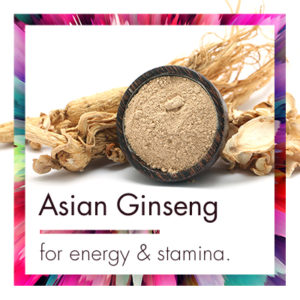
Asian ginseng is an herb native to China, Korea, and Siberia, and the root is the therapeutic part of the plant. This is a popular remedy, both in Chinese medicine and in western herbal medicine, often used to restore energy and stamina. Ginseng is also known for its ability to calm the central nervous system and relieve stress, as well as for its antioxidant and pro-immunity effects. It can also improve memory, heart health, blood sugar balance, and mood, as well as hot flashes. It may also reduce the risk of some of the most common types of cancer. I personally take it most often for its anti-stress effects. It gives me a boost of energy when I’m feeling worn down and burned out.
Astragalus for Immunity
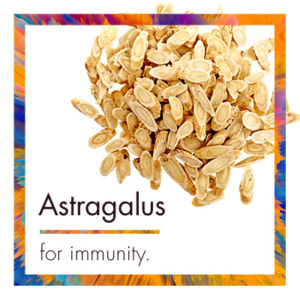 This is another one of my favorites for energy. It’s a flowering plant from Asia often used in Traditional Chinese Medicine as a tonic for many different health issues, but especially as an immune system supporter. According to Chinese medicine, this is due toits ability to increase qi, or life force energy, but western science has also studied its ability to stimulate the pituitary-adrenal axis and restore depleted red blood cells in bone marrow, which can have a positive effect on hormone balance, anxiety, and energy. Research shows that the constituents of astragalus, including saponins and flavonoids, have anti-inflammatory, immunostimulant, antioxidative, anti-cancer, anti-diabetic, cardio-protective, hepato-protective (liver-protective), and antiviral activity. That’s a lot of power in one little plant! I often take it along with ginseng. I also like its anti-inflammatory and antimicrobial effects, and the way it increases circulation, which helps me regain my glow when I’m over-tired.
This is another one of my favorites for energy. It’s a flowering plant from Asia often used in Traditional Chinese Medicine as a tonic for many different health issues, but especially as an immune system supporter. According to Chinese medicine, this is due toits ability to increase qi, or life force energy, but western science has also studied its ability to stimulate the pituitary-adrenal axis and restore depleted red blood cells in bone marrow, which can have a positive effect on hormone balance, anxiety, and energy. Research shows that the constituents of astragalus, including saponins and flavonoids, have anti-inflammatory, immunostimulant, antioxidative, anti-cancer, anti-diabetic, cardio-protective, hepato-protective (liver-protective), and antiviral activity. That’s a lot of power in one little plant! I often take it along with ginseng. I also like its anti-inflammatory and antimicrobial effects, and the way it increases circulation, which helps me regain my glow when I’m over-tired.
Ashwagandha for Anxiety
 Ashwagandha, another one of my favorites, is one of the most utilized herbs in Ayurveda, the ancient health system of India. Ashwagandha is sometimes called Indian ginseng. Research has shown that ashwagandha has a significant stress-reducing effect compared to a placebo, lowering the level of cortisol, a primary stress hormone. It also has a demonstrated effect on anxiety and fatigue, and has even been shown to reduce stress-related food cravings and to reduce body weight in adults with obesity suffering from chronic stress. It’s also used for recovery after exercise and has a hormone-balancing effect, which is probably why so many women use it to help calm PMS symptoms. I like to take it in the evening, to help me relax so I get a better sleep, but it’s also good for those days you know will be especially stressful.
Ashwagandha, another one of my favorites, is one of the most utilized herbs in Ayurveda, the ancient health system of India. Ashwagandha is sometimes called Indian ginseng. Research has shown that ashwagandha has a significant stress-reducing effect compared to a placebo, lowering the level of cortisol, a primary stress hormone. It also has a demonstrated effect on anxiety and fatigue, and has even been shown to reduce stress-related food cravings and to reduce body weight in adults with obesity suffering from chronic stress. It’s also used for recovery after exercise and has a hormone-balancing effect, which is probably why so many women use it to help calm PMS symptoms. I like to take it in the evening, to help me relax so I get a better sleep, but it’s also good for those days you know will be especially stressful.
Rhodiola for Endurance and Fat Loss
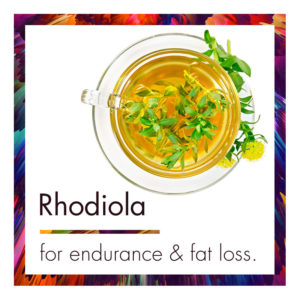 My final favorite is rhodiola, a high-altitude plant that has been used for centuries in traditional folk medicine in Europe, Asia, and Russia. Supposedly, it was used in Mongolia for cancer and tuberculosis, in Siberia for fertility, and by the Vikings, for endurance and strength. After all this time, it seems to be back in fashion, now mostly used for physical and mental fatigue and exercise performance, and for a mood-booster. I mostly see it in articles about the benefits of adaptogens. There isn’t a lot of research on rhodiola yet, but some studies do show an effect on endurance and an improvement in fatigue. There is also some evidence that taking rhodiola extract while also doing moderate exercise will specifically increase belly fat loss.
My final favorite is rhodiola, a high-altitude plant that has been used for centuries in traditional folk medicine in Europe, Asia, and Russia. Supposedly, it was used in Mongolia for cancer and tuberculosis, in Siberia for fertility, and by the Vikings, for endurance and strength. After all this time, it seems to be back in fashion, now mostly used for physical and mental fatigue and exercise performance, and for a mood-booster. I mostly see it in articles about the benefits of adaptogens. There isn’t a lot of research on rhodiola yet, but some studies do show an effect on endurance and an improvement in fatigue. There is also some evidence that taking rhodiola extract while also doing moderate exercise will specifically increase belly fat loss.
Should you try adaptogens? It has been my experience, both in treating patients and in my own health routine, that adaptogens offer big benefits for a modest price. There are others I haven’t mentioned here, such as He Shou Wu for anti-aging and beauty, Moringa for a nutritional boost, Maca for energy and hormone balance, Mucuna Pruriens for digestion and libido, Schisandra Berry for liver health and improved skin and hair quality, and medicinal mushrooms like lion’s mane for brain health and better concentration, reishi for weight loss and anxiety relief, and chaga for anti-inflammatory and cholesterol-lowering effects. I’ll talk about all of these in future blogs, but if you want to take what I take, start with the four adaptogen superstars I’ve described here, and enjoy increased resilience and homeostasis in the face of chronic stress.
SOURCES
https://dx.doi.org/10.1186%2Fs13020-018-0214-9
https://doi.org/10.3390/ph3010188
https://doi.org/10.1016/0378-8741(92)90057-X
https://doi.org/10.3390/molecules191118850
https://journals.sagepub.com/doi/pdf/10.1177/1534735415580676
https://dx.doi.org/10.4103%2F0253-7176.106022
https://pubmed.ncbi.nlm.nih.gov/27055824/
